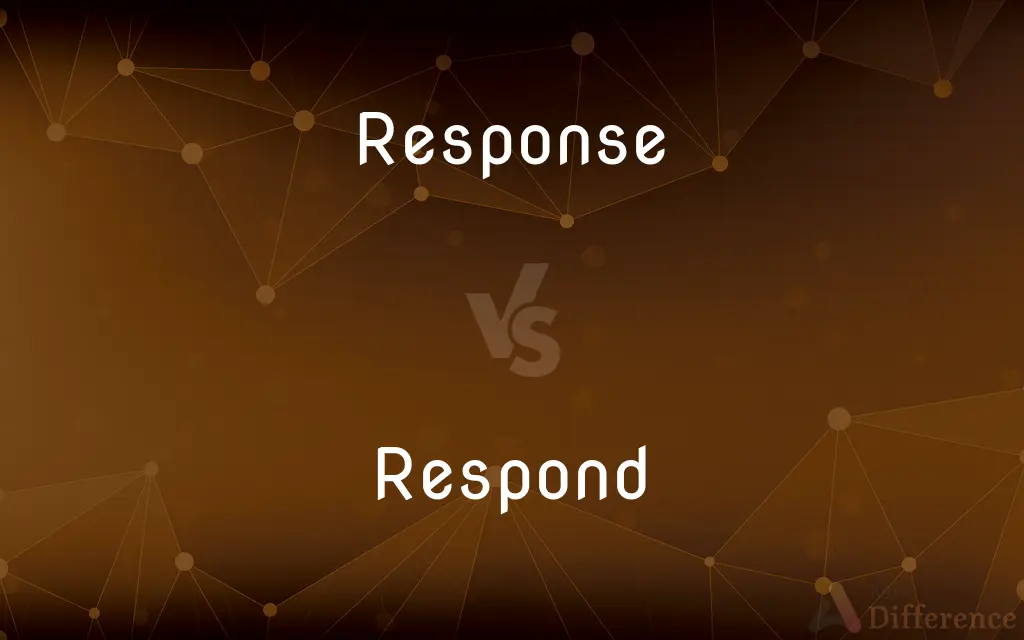Response vs. Respond — What's the Difference?
By Tayyaba Rehman — Updated on August 28, 2023
"Response" is a noun referring to a reaction or reply, while "respond" is a verb meaning to react or reply.

Difference Between Response and Respond
Table of Contents
ADVERTISEMENT
Key Differences
"Response" and "respond" both pertain to the act of answering or reacting to something. The primary distinction between the two lies in their grammatical functions. "Response" is a noun that designates the act or process of replying or reacting. For instance, when someone poses a question, the answer given can be termed as a "response." Conversely, "respond" is a verb that denotes the action of giving a reply or reacting. If someone were to ask a question, and one were to give an answer, they would "respond" to the query.
Another way to view the difference between "response" and "respond" is by examining their usage in sentences. With "response," one can expect to see articles or modifiers preceding it, such as "a response" or "the immediate response." In contrast, "respond" would be employed with subjects and, at times, objects, indicating who is performing the action and to whom, as in "She didn't respond to his calls."
The structure of sentences further illustrates the distinction. Using "response," one might say, "The response was overwhelming," which implies a focus on the reaction itself. On the other hand, with "respond," the sentence could be "The audience responded with applause," highlighting the action taken by the audience.
While both terms are integral to communication dynamics, "response" often emphasizes the content or effect of the reaction, while "respond" places emphasis on the act or process of reacting.
Comparison Chart
Grammatical Function
Noun
Verb
ADVERTISEMENT
Sentence Usage
"The response was unexpected."
"She didn't respond to the email."
Associated Words
Articles (a, the), modifiers
Subjects, objects
Indication
Refers to the reaction or reply itself
Refers to the act of replying or reacting
Focus in Communication
Emphasizes the content/effect of the reaction
Emphasizes the act/process of reacting
Compare with Definitions
Response
A reaction to a stimulus or event
The response to the disaster was swift and coordinated.
Respond
To answer or reply to someone
She did not respond to his messages.
Response
An answer to a question
She wrote a lengthy response to the interview query.
Respond
To exhibit a reaction
The patient responded positively to the new medication.
Response
The result of an action
The patient showed a positive response to the treatment.
Respond
To react to a stimulus or event
The market did not respond well to the news.
Response
A reaction to something
An extended, jazzy piano solo drew the biggest response from the crowd
An Honours degree course in Japanese has been established in response to an increasing demand
Respond
To acknowledge a situation
He responded quickly to the emergency.
Response
A responsory.
Respond
To make a reply; answer
Respond to an email.
Response
An online advertising performance metric representing one click-through from an online ad to its destination URL.
Respond
To react to a stimulus or to a treatment, especially in a favorable way
Tumors that responded to radiation.
Response
An answer or reply.
Respond
A pilaster or half-pier engaged to a wall and carrying one end of an arch or groin, often at the end of an arcade.
Response
A statement (either spoken or written) that is made in reply to a question or request or criticism or accusation;
I waited several days for his answer
He wrote replies to several of his critics
Respond
To say something in return; to answer; to reply.
To respond to a question or an argument
Response
The manner in which something is greeted;
She did not expect the cold reception she received from her superiors
Respond
A response.
Response
A statement in reaction to something
His comment elicited a fiery response from the community.
Respond
(architecture) A half-pillar, pilaster, or any corresponding device engaged in a wall to receive the impost of an arch.
Response
A verbal or written answer
There was laughter at his response to the question
We received 400 applications in response to one job ad
Respond
A respond is a half-pier or half-pillar which is bonded into a wall and designed to carry the springer at one end of an arch.
Response
The act of responding.
Respond
To act in return or in answer
Firefighters responding to a call.
Response
A reply or an answer.
Respond
To give as a reply; answer.
Response
A reaction, as that of an organism or a mechanism, to a specific stimulus
A microphone's response to certain frequencies.
Response by the immune system to a pathogen.
Respond
(intransitive) To act in return; to carry out an action or in return to a force or stimulus; to do something in response.
Response
(Ecclesiastical) Something that is spoken or sung by a congregation or choir in answer to the officiating minister or priest.
Respond
(ambitransitive) To correspond with; to suit.
Response
An answer or reply, or something in the nature of an answer or reply.
Respond
(transitive) To satisfy; to answer.
The prisoner was held to respond the judgment of the court.
Response
The act of responding or replying; reply: as, to speak in response to a question.
Respond
(intransitive) To be liable for payment.
Response
An oracular answer.
Respond
A versicle or short anthem chanted at intervals during the reading of a lection.
Response
(liturgics) A verse, sentence, phrase, or word said or sung by the choir or congregation in sequence or reply to the priest or officiant.
Respond
To say somethin in return; to answer; to reply; as, to respond to a question or an argument.
Response
(liturgics) A versicle or anthem said or sung during or after a lection; a respond or responsory.
Respond
To show some effect in return to a force; to act in response; to accord; to correspond; to suit.
A new affliction strings a new cord in the heart, which responds to some new note of complaint within the wide scale of human woe.
To every theme responds thy various lay.
Response
A reply to an objection in formal disputation.
Respond
To render satisfaction; to be answerable; as, the defendant is held to respond in damages.
Response
A reaction to a stimulus or provocation.
Respond
To answer; to reply.
Response
The act of responding.
Respond
To suit or accord with; to correspond to.
For his great deeds respond his speeches great.
Response
A result;
This situation developed in response to events in Africa
Respond
An answer; a response.
Response
A bodily process occurring due to the effect of some foregoing stimulus or agent;
A bad reaction to the medicine
His responses have slowed with age
Respond
A short anthem sung at intervals during the reading of a chapter.
Response
A phrase recited or sung by the congregation following a versicle by the priest or minister
Respond
A half pier or pillar attached to a wall to support an arch.
Response
The speech act of continuing a conversational exchange;
He growled his reply
Respond
Show a response or a reaction to something
Response
A feedback or reply
We are awaiting a response from the company regarding our proposal.
Respond
Reply or respond to;
She didn't want to answer
Answer the question
We answered that we would accept the invitation
Respond
Respond favorably or as hoped;
The cancer responded to the aggressive therapy
Respond
To provide feedback
The company responded with an official statement.
Common Curiosities
What part of speech is "response"?
"Response" is a noun.
How do I use "respond" in a sentence?
You can say, "She will respond to your email soon."
Is it correct to say "We are waiting for them to response"?
No, it should be "We are waiting for them to respond."
Is "respond" a noun or a verb?
"Respond" is a verb.
Which indicates the action, "response" or "respond"?
"Respond" indicates the action.
Can "respond" be used in the passive voice?
Yes, e.g., "The email was not responded to."
Which word focuses on the content of a reaction?
"Response" focuses on the content of a reaction.
Can I say "He gave a quick respond"?
No, the correct usage is "He gave a quick response."
If I'm talking about a reaction, should I use "response" or "respond"?
Use "response" when referring to the reaction itself and "respond" when discussing the act of reacting.
Do "response" and "respond" come from the same root?
Yes, both words have roots in the Latin verb "respondēre," meaning "to reply."
Share Your Discovery

Previous Comparison
Pharynx vs. Larynx
Next Comparison
Monomer vs. PolymerAuthor Spotlight
Written by
Tayyaba RehmanTayyaba Rehman is a distinguished writer, currently serving as a primary contributor to askdifference.com. As a researcher in semantics and etymology, Tayyaba's passion for the complexity of languages and their distinctions has found a perfect home on the platform. Tayyaba delves into the intricacies of language, distinguishing between commonly confused words and phrases, thereby providing clarity for readers worldwide.













































